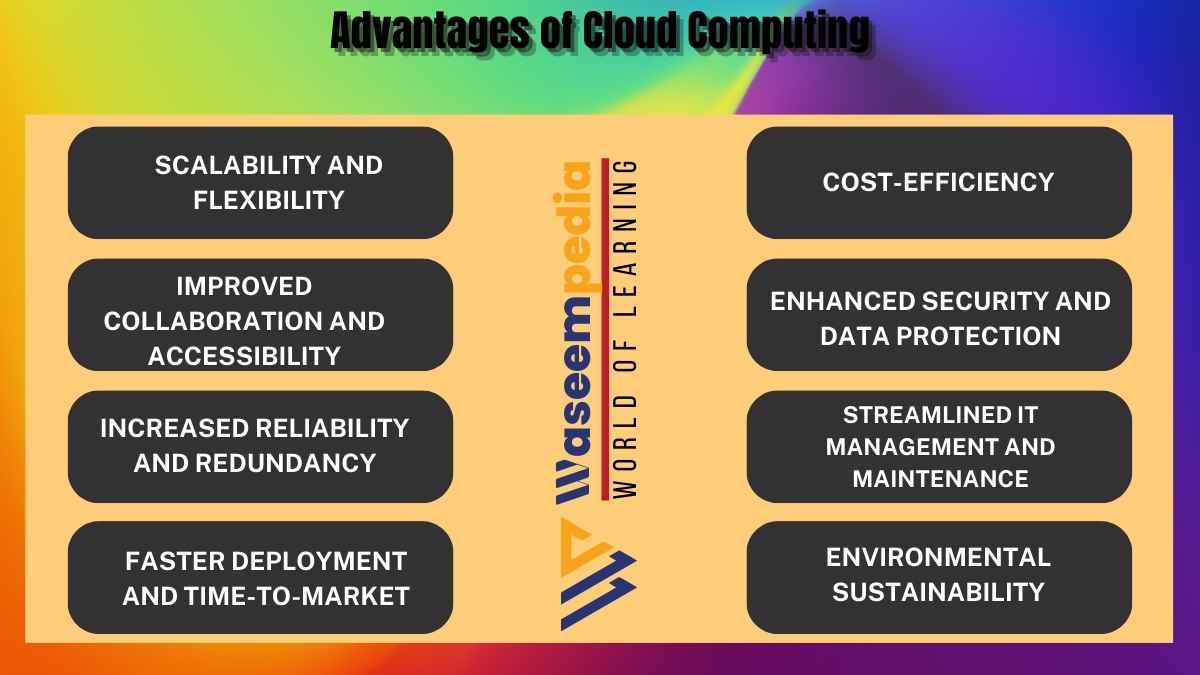There are many Advantages of Cloud computing such as innovate, grow, and thrive in today’s digital economy. From scalability and cost-efficiency to enhanced security and global reach, the benefits of cloud computing are undeniable. By embracing cloud services, businesses can streamline operations, drive efficiency, and unlock new opportunities for innovation and growth in a rapidly evolving landscape.
Introduction to Cloud Computing
Cloud computing has revolutionized the way businesses and individuals access, store, and manage data and applications. It involves delivering computing services over the internet, allowing users to access resources such as servers, storage, and software on-demand, without the need for on-site infrastructure. The advantages of cloud computing are numerous and far-reaching, offering scalability, flexibility, and cost-efficiency to organizations of all sizes.

9 Advantages of Cloud Computing
There are many advantages of Advantages of Cloud Computing but waseempedia explain the 9 Advantages of Cloud Computing that are as given below:
1. Scalability and Flexibility
One of the primary advantages of cloud computing is its scalability and flexibility. Cloud services can be scaled up or down based on demand, allowing organizations to adjust resource allocation to match changing needs. Whether experiencing rapid growth or seasonal fluctuations, cloud computing provides the agility and flexibility to scale resources dynamically, ensuring optimal performance and cost-efficiency.
2. Cost-Efficiency
Cloud computing offers cost-efficiency by eliminating the need for upfront investment in on-premises infrastructure and maintenance. With cloud services, organizations pay only for the resources they use on a pay-as-you-go basis, avoiding the expense of purchasing and maintaining hardware and software. This cost-effective pricing model allows businesses to reduce capital expenditures, optimize IT budgets, and allocate resources more strategically.
3. Improved Collaboration and Accessibility
Cloud computing facilitates improved collaboration and accessibility by providing remote access to data and applications from any location with an internet connection. Teams can collaborate in real-time, sharing documents, files, and information seamlessly, regardless of geographical barriers. This enhanced collaboration enhances productivity, streamlines workflows, and fosters innovation within organizations.
4. Enhanced Security and Data Protection
Contrary to common misconceptions, cloud computing offers enhanced security and data protection compared to traditional on-premises systems. Cloud service providers invest heavily in robust security measures, including encryption, authentication, and access controls, to safeguard sensitive data and protect against cyber threats. Additionally, cloud providers adhere to strict compliance standards and regulations, ensuring data privacy and regulatory compliance for businesses across industries.
5. Increased Reliability and Redundancy
Cloud computing offers increased reliability and redundancy through distributed infrastructure and data centers. Cloud service providers operate multiple data centers across geographically diverse locations, ensuring high availability and uptime for critical applications and services. In the event of hardware failures or outages, cloud providers employ redundancy and failover mechanisms to maintain uninterrupted service, minimizing downtime and ensuring business continuity.
6. Streamlined IT Management and Maintenance
Cloud computing streamlines IT management and maintenance by offloading infrastructure management tasks to cloud service providers. Organizations no longer need to worry about hardware provisioning, software updates, or routine maintenance, as these responsibilities are handled by the cloud provider. This allows IT teams to focus on strategic initiatives and innovation rather than day-to-day maintenance tasks, driving operational efficiency and productivity.
7. Faster Deployment and Time-to-Market
Cloud computing enables faster deployment of applications and services, reducing time-to-market and accelerating innovation cycles. With cloud services, organizations can provision resources instantly, deploy applications rapidly, and scale infrastructure on-demand, eliminating the delays associated with traditional hardware procurement and setup. This agility allows businesses to respond quickly to changing market conditions, seize opportunities, and gain a competitive edge.
8. Environmental Sustainability
Cloud computing promotes environmental sustainability by optimizing resource utilization and reducing energy consumption. Cloud providers leverage economies of scale to operate energy-efficient data centers and infrastructure, minimizing carbon emissions and environmental impact. By consolidating workloads and sharing resources among multiple users, cloud computing reduces the carbon footprint associated with on-premises data centers, contributing to a greener, more sustainable future.
9. Global Reach and Market Expansion
Cloud computing enables organizations to expand their reach and enter new markets with ease. By leveraging cloud services, businesses can deliver applications and services to customers worldwide, without the need for physical infrastructure or local presence. This global reach allows organizations to tap into new markets, reach new customers, and drive business growth and expansion on a global scale.
Summary of Advantages of Cloud Computing
Cloud computing is a modern way for businesses and individuals to use and manage data and software over the internet. It offers many benefits, such as:
- Scalability and Flexibility: Cloud services can adjust to meet changing needs, whether a business is growing quickly or has seasonal fluctuations.
- Cost-Efficiency: Organizations only pay for the resources they use, saving money on upfront investments in hardware and software.
- Improved Collaboration: Teams can work together from anywhere with internet access, sharing files and information easily.
- Enhanced Security: Contrary to what some might think, cloud computing is secure, with measures in place to protect data from cyber threats.
- Increased Reliability: Cloud providers have multiple data centers, reducing the chances of downtime and ensuring services are always available.
- Streamlined IT Management: Cloud providers handle tasks like updates and maintenance, freeing up time for IT teams to focus on important projects.
- Faster Deployment: Applications can be set up quickly, allowing businesses to innovate and respond to market changes faster.
- Environmental Sustainability: Cloud computing reduces energy consumption and carbon emissions compared to traditional methods.
- Global Reach: Cloud services allow businesses to reach customers worldwide without needing physical infrastructure in each location.
Overall, cloud computing offers many advantages that help businesses grow and succeed in today’s digital world.

